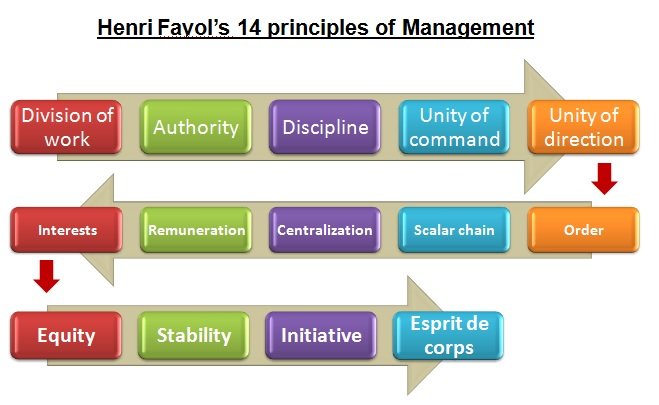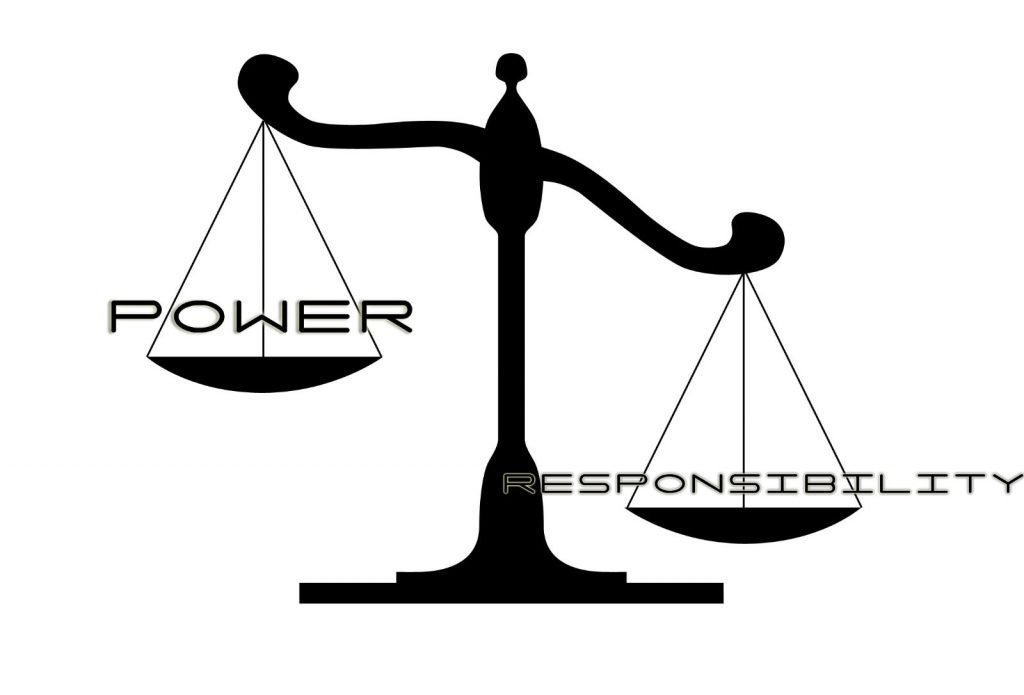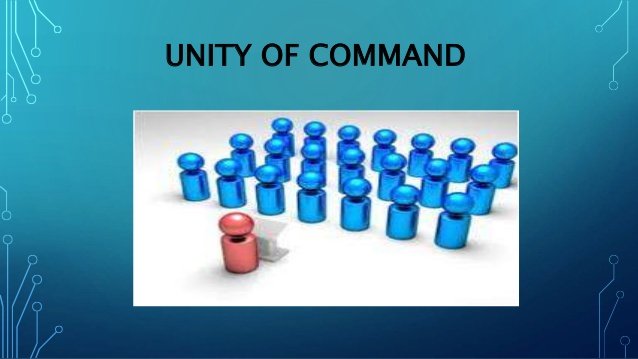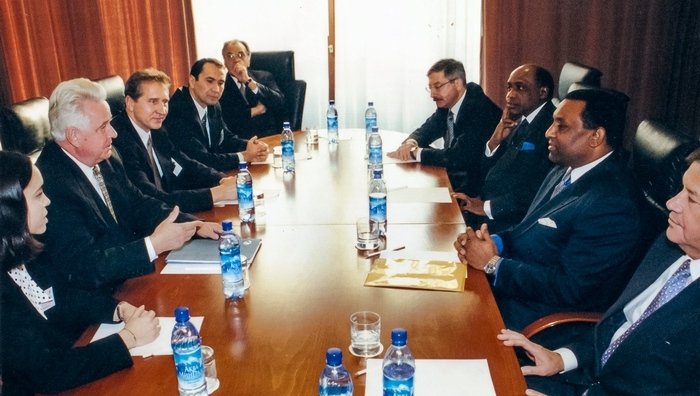14 Principles of management for better business operations
Henri Fayol proposed 14 principles of management for effective decision making and for giving guidelines for management actions. 14 principles of management are the essence of his research and it was published in 1916, titled ‘General and Industrial Management’. Due to the globalization and with the growing business activities and industries, managers are facing problems with decision making and implementation. Here the secret behind successful organizations is understanding and practicing principles of management.
Henri Fayol is the father of modern management theory. The statements of Fayol’s 14 principles are based on the fundamental truth which is helpful in management actions and decision making for the successful running of the organizations. After years of study and research, he synthesized and proposed these 14 principles of management.

Division of work
According to Henri Fayol division of work into small tasks facilitates managers to assign various tasks to workforce those who are specialized in that particular task. Division of work simplifies the entire work and motivates the workforce to perform the tasks with more perfection, accuracy, and speed.
Authority and Responsibility

Authority and responsibility must go hand in hand i.e. there should always be a balance between the authority and responsibility. Authority without responsibility results in inefficient leadership and irresponsible behavior, whereas in another case responsibility without authority results in the ineffective utilization of manpower. Though a person may be responsible but without authority, he/she cannot bring change in the organization.
So while taking key managerial decisions and recruiting candidates for key managerial positions, organizations must select the right candidates with both leadership skills and responsibility.
Discipline
Management should encourage the entire manpower to follow organization’s rules, regulations, policies, and principles. Such a common effort of workers towards the interests of the organization can bring discipline in the work environment. In order to encourage this common effort management should communicate with the workforce to motivate them to follow discipline. Penalties should also be applied judiciously to eliminate the indiscipline from the organizations.
So the managers should raise questions such as
- What measures to be taken in order to bring discipline?
- How to communicate with the workers or employees in order to make them understand about organization’s discipline?
- What should disciplinary actions be taken to eliminate conflicts in the work environment?
Unity of command

Henri Fayol’s principle of unity of command means that a group of employees or an individual employee should receive orders from a single manager. If more than one boss passes orders then the employees may get confused to follow instructions of many bosses. All the leader’s approach may not be similar, different managers have different leadership styles. More importantly, communication barriers and the work procedure may also differ from one boss to another. All such factors highly bring dissatisfaction in the work group.
Applying the principle unity of command in the organizations promotes good relations in between superiors and subordinates; it highly reduces conflicts while assigning tasks. By introducing single head, single plan concept organizations can reach the desired objectives without difficulty. It reduces the confusions in the work group that whose orders they should follow.
Unity of direction
The principle “unity of direction” can lead the individual goals towards the organization’s goals. Organizational goals should be fulfilled by the common efforts of the employees. If the individual objectives are different from the group objectives then such organizations may not reach the desired objectives. So operating the functions of various subsidiaries towards the interests of the organization is possible through this principle. For example, if an organization is a non-profit motive, and its employees are working for profit-making, then such efforts may not fulfill the goals and existence of the firm. This one plan concept highly reduces the confusions in the workforce and clarifies what they have to do for the effective contribution of their services to reach the common objectives.

By introducing the concept unity of direction in the modern organizations it maximizes team spirit, discipline, clarity in reaching goals, and in developing more powerful teams. It helps in reducing unnecessary duplication of efforts, confusions, and wastage of resources. Various departments of the organization do not follow the similar strategies to fulfill their tasks, but all their efforts should contribute towards the success of the organization.
Subordination of individual interests to the general interests
Employees of an organization have different personal interests, but these should not dominate and ruin the reason for the existence of the organization. According to Henri Fayol, individual interests should always be subordinate to the interests of the firm. So a single person’s interests and thought process should not disturb the work environment. In the case of conflict or dispute arises regarding individual interests and organizations interests, then the individual interests must be sacrificed to fulfill the bigger interest.

Applying this concept and creating awareness can act as a guideline for the effective achievement of the group goals. So the managers should build a rapport with the employees to make them understand this concept. Subordination of individual interests should always support the reason for the existence of the firm and in turn, it can fulfill the belongingness, self-esteem and self-actualization needs of the employees.
Hence transforming individual interests towards group interests can bring team spirit and helps in developing more powerful teams.
Remuneration
According to Henri Fayol’s 14 principles remuneration must be paid to the employees as per the cost of living, general market conditions, experience, and skills. Fair remunerations can keep the employee motivation levels high and it can make them more efficient, innovative, creative and loyal towards the organization.
Remunerations may be monetary or non-monetary, here monetary benefits include salary, bonus, incentives and other financial benefits, whereas non-monetary benefits include non-financial benefits such as rewards, gifts, recognition and promotion.

When the employee needs are fulfilled by giving proper compensation then they never think about applying for other jobs. Fair remuneration practice reduces the employee turnover and efforts of recruiting. Organizations should not take it as a simple matter because it may become a competitive advantage to the rival firms.
- So the organizations must pay remuneration according to the industry standards, market demand and cost of living.
- Non-monetary benefits maximize the employee motivation levels and it can make them loyal towards the organization.
The Degree of centralization
Decision-making authority must be balanced according to the volume and size of the firm including hierarchy. If the decision-making authority is concentrated at the top level management then it is known as centralized decision making, whereas authority is delegated to the middle level and lower level management, then it is known as decentralization. Depending on the size of the organization managers must take decisions regarding centralization or decentralization in order to maintain the balance.

Multinational companies with many subsidiaries follow decentralization in order to take decisions fit for the local business environment where the subsidiary is located. In such cases, centralized decisions may not be effective and suitable. In the case of smaller organizations, centralization is seen. In some cases smaller organizations also follow decentralization in decision-making in order to get the work done faster, however, it depends on the size of the business and nature of its business operations.
- So the managers must check whether their approach is centralized or decentralized
- Which techniques will help their organization
- Need for the delegation of authority
- Must maintain balance between centralization and decentralization
Scalar chain
Scalar chain principle says that there should be an unbroken, straight chain of command exist between the lower level and the ultimate level of the hierarchy each manager possess a certain amount of authority in all the levels of the hierarchy. First line supervisor possess the least authority, whereas the managers of the top most position possess highest authority to take decisions and to the control the business operations
According to scalar chain principle, there must be a clear path of authority in the firms so that the employees can report to the higher level managers when they face calamities or emergencies. They should know whom to they complain if their immediate superior does not resolve their problems and queries.

For example, if a customer’s problem is not resolved in three days then it goes to the next level i.e. to the local managers, if the complaint is not resolved in Five days then it goes to the regional managers, then also it is not resolved then the complaint goes to national heads.
An unbroken and straight chain of command and authority passes and increases from the lower level to the top most level in the organizations can create transparency and eliminates confusions from the minds of the employees.
Order

According to Henri Fayol, all the materials and people must be placed in a right order. In order to work in an efficient manner, workers/employees need the right procedure and right equipment all the time. To perform a specific kind of work, specific materials and skilled people related to that particular task must be treated as equally as possible.
Maintaining order in the workplace maximizes efficiency and coordination. If a firm does not work in an orderly manner, then it may be the result of inefficiency and leads to chaos. In such a work environment it is not possible to maintain coordination in between men and materials.
In addition to the arrangement of man and materials, it is very important to take actions to maintain the workplace hygiene and maintenance of materials; it can highly reduce the wastage of efforts and time. A simple example can make it clear, if the workers or employees have to work with wrong equipment, wrong materials, wrong procedure and at wrong place then all the efforts may become useless.
Equity

The management principle of equity says that all the employees or workers of the organization must be treated fairly, equally and impartially. Maintaining equity in the organizations come from the organization’s culture; adopting and maintaining equity maximizes employee loyalty and trustworthiness.
The combination of kindliness and justice is very important to achieve equity and to adopt in the organization culture. If an organization follows ethics and right organization culture then it is not necessary to put extra efforts to maintain equity in the workplace. If all the employees not treated equally and giving preference over few employees or a particular group then it leads to conflicts and revolutions.
Misunderstanding and misinterpretations from the minds of employees must be cleared with proper communication and with regular interactions. If something is done favorable towards a particular employee then the managers must give clarity to the other employees that what situations made them do it; and it must be justified.
Stability of tenure

The increase in employee turnover increases the cost of training and development and it can act as a competitive advantage to the rival firms. Usually, the high attrition rate is problematic in various aspects. Generally, employees leave the organizations due to the lack of job satisfaction, insufficient salary, shift inconvenience, superior’s domination, peer unacceptance etc. Henri Fayol stressed that the stability of tenure can maximize the profits, it enables the firms to give better salaries and to provide better working conditions.
Employee satisfaction is the only solution to reduce the rate of attrition and cost of training the new employees, sometimes attrition may result in expensive mistakes and rejection of projects due to hiring new employees. So the managers should know the problems of the employees and reasons behind leaving the organization. Giving priority to reduce the attrition rate and taking necessary actions in order to retain the employees maximizes the profits and production. Retaining the skilled employees can act as a competitive advantage to the firms.
Initiative

Management must encourage the worker or employee initiative in order to bring additional energy to the organization. Most of the successful organizations create such an environment to maximize employee initiatives, creativity and innovations.
Identifying and encouraging skilled and talented employees can make them initiative in putting their efforts in a unique way; it results in innovations and creations.
Some companies regularly introduce new products and services to the customers; it is only possible through the skills, talent, and initiative of the manpower of that particular company. As long as freedom is given in the work environment it automatically brings out hidden talents, skills, and commitment.
Managers should know the fact that the initiation comes from the positive motivation and encouragement.
Esprit de Corps

Management must encourage team spirit and unity so that it brings out mutual loyalty and feeling of pride. Esprit de corps facilitate the union of the employees and management which creates a feeling of loyalty in the minds of employees and management also.
Team spirit can act as a support to decision making and implementation, healthy team environment such as superior, subordinate mutual understandings and peer relations maximizes spirit among the members of the team.




